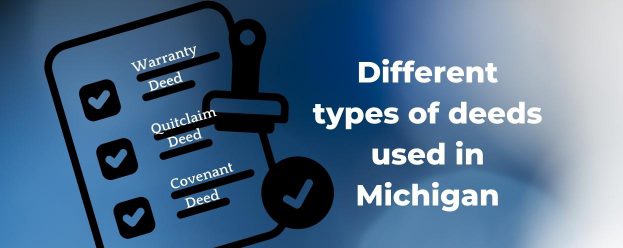10th May 2022

A deed is a signed legal document that gives a person title to real estate. Deeds are used to transfer ownership of real estate from one party to another. There are different types of deeds for different circumstances and the State of Michigan recognizes three different types. They are:
- Warranty Deeds
- Quitclaim Deeds
- Covenant Deeds
Warranty Deeds
With a warranty deed the seller, also called the grantor, guarantees the property has a clear title and that the grantor has the right to transfer the property. The grantor generally will have a title company conduct a search of the title to find any problems with the title, and will purchase title insurance that guarantees clean title at the time the warranty deed is given. This type of deed protects the buyer or grantee because the buyer will not have to worry about any third-party claims against the property.
Quitclaim Deeds
With a quitclaim deed, a seller or grantor is still transferring a piece of property to a buyer, but is not guaranteeing that the property has a clean title. Because a title search does not need to be conducted, a quitclaim deed is usually the easiest and least expensive way to transfer property, but it can also be very risky if you do not know the seller or grantor. Quitclaim deeds are common when the two parties have complete trust in each other which in return would mean the buyer does not have a need for a warranty on the property. A property is transferred “as is” through a quitclaim deed. This means that if there are any liens on the property, the buyer or grantee will be responsible for them. Also, if the grantor only owns a portion of the property being transferred, then the quitclaim deed only covers the portion the grantor owns.
Covenant Deeds
With a covenant deed, the grantor gives a limited warranty on the title to the property. The warranty the grantor gives in this type of deed is limited to the time the grantor owned the property. The grantor promises that the grantor did not do anything to cause problems with the title but is not guaranteeing the property before it belonged to the grantor. In Michigan, covenant deeds can be used by a personal representative of an estate or by a trustee of a trust.
The following must be included on all deeds:
- Date of transfer.
- Names and addresses of the grantor(s) and grantee(s).
- A description of the property that is being transferred.
- Signature of the grantor(s).
- Notarization of the grantor’s signature.
If you would like additional information on the three different types of deeds used in Michigan, please contact Beier Howlett.
Related Articles


